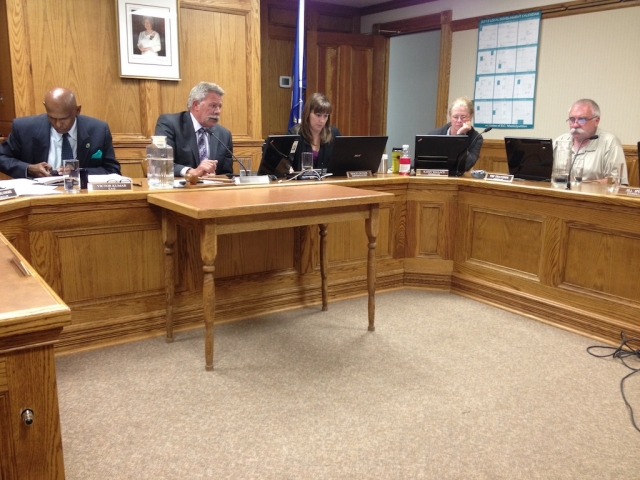DCCs are dead, city moves towards new ways to recover development infrastructure costs
Council finalized the repeal of both Development Cost Charges (DCCs) and the Regional District Sewer Service Cost Recovery Service (SSCR) on Monday, and now staff will begin to draft a new development charge to help the municipality recover infrastructure costs incurred by new development.
Statutory approval for the DCC repeal was signed by the Deputy Inspector of Municipalities, Glen Brown, on May 7 and was received by the city on May 10.
Brown reminded the city in his letter of approval, “It must be ensured that the money currently in the DCC funds are only expended on the approved DCC projects on the Works Plan.”
DCCs are charged separately for specific projects in the three core services. Funds available for future projects include $51,032 for roads, $436,805 for water works, and $118,205 for sewage.
Council plans to replace the DCCs with a new Service Capacity Connection Charge (CCC), but first it was necessary to repeal the DCC. The change has been in the works since the previous council asked staff to investigate alternatives to the DCC last year.
There is a long history to the debate, as described in Telegraph articles on Mar 7, 2012, and Sept 14, 2011. The previous council asked staff to examine potential alternatives to the DCCs after the majority on council found the DCCs a poor fit for Rossland. Staff came back with the CCC.
City staff wrote to council, “The key benefit [of the DCC repeal] is that the City may now move forward in developing a tool that will better serve the purpose related to direct development and cost recoveries for infrastructure development than does a DCC Bylaw.”
Everyone on council agreed, with the exception of Coun. Kathy Moore.
Moore said that while she had initially been in favour of CCCs, “as I looked into it a little more, I didn’t get the answers I was looking for. I hope we’ll get something better [than DCCs].”
She also said that she thought the DCC versus CCC debate was “not the biggest issue,” and was more concerned that the growth projections the DCCs were based on should be revised instead.
“I would have liked us to revise the [unrealistic] growth projections and to revise the [DCC] project list,” she said, targeting two of the main problems with the DCC that led council to scrap them.
Coun. Tim Thatcher, while still in favour of scrapping DCCs, agreed with Moore that “the population projections need to be revised. They seem unrealistic.”
Mayor Greg Granstrom argued that DCCs are better suited for towns experiencing development booms and expansion, unlike Rossland where “there isn’t a whole lot of development going on,” he said.
Nevertheless, the mayor said that the city is in no way disadvantaged by the repeal. If a new development were proposed, he said, the city could sit down to negotiate on infrastructure costs and other issues “in a New York minute.”
Coun. Jill Spearn clarified that the city will also retain the ability to negotiate for park space, trails, and so forth. “I don’t want to lose that opportunity for our citizens,” she said.
The mayor concurred, “It could be even more flexible [than the DCCs were.] It would all be in negotiations, and we can do that any time.”
Coun. Moore said, “It sounds great … but from the point of view of the developer there’s no certainty.” She added, “What we had before was pretty cut-and-dried,” compared to negotiations which she likened to a “horse trading deal,” that would appear “more incomprehensible for people in the community.”
Granstrom conceded, “There’s a trade off, no doubt, but negotiations would better suit individual developments [than the DCCs].”
Spearn added that she had spoken with several developers about the issue, “and they definitely prefer CCCs to DCCs. The find [DCCs] are an impediment,” and want something that’s “easier to deal with and less administrative.”
The mayor also pointed out that DCCs have to be paid “up front” at the beginning of development, whereas CCCs will be able to be paid later, for example when a unit sells. This is a “cost friendly” advantage to developers, he said.
The DCC repeal passed with Moore voting against.
In their recommendation to council that the SSCR be repealed as well, staff wrote: “The key benefit is that the City may now move forward in developing a tool(s) that will better serve the purpose related to direct development and cost recoveries for infrastructure development.”
The SSCR has accumulated a balance of $118,205.
Coun. Kathy Moore asked about the intention of the SSCR and whether it would be replaced, but the mayor and CAO Victor Kumar advised that the meeting would have to go in camera if details were to be discussed.
























